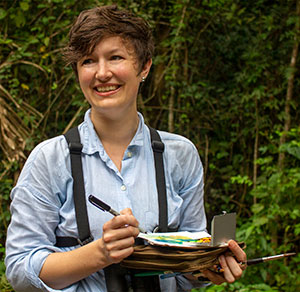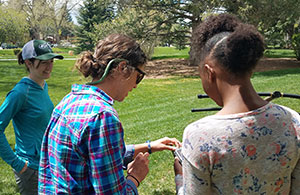UW’s Garramon Merkle Receives $1M NSF Grant to Study Science Communication Training for Graduate Students
Published September 16, 2024

Bethann Garramon Merkle, a University of Wyoming assistant professor of practice, has been awarded a $1 million collaborative National Science Foundation (NSF) grant to study ways to enhance graduate students’ ability to communicate science effectively and ethically.
Garramon Merkle’s five-year grant is the first time that the NSF Division of Graduate Education has funded an Innovations in Graduate Education (IGE) award at UW. The goals of IGE are to pilot, test and validate innovative approaches to graduate education and to generate the knowledge required to move these approaches into the broader community.
As the principal investigator of the project, titled “SciComm LIFT: Leveraging Institutional capacity for eFfective graduate student Training,” Garramon Merkle is collaborating with colleagues from American University, Colorado State University and the University of Denver. Over $742,000 of the funding will come to UW; the remainder supports the collaborating institutions.
The research focuses on communication training because communication is the top job skill required across all sectors. Previous research indicates graduate students themselves recognize the need for training in translational skills -- such as communication -- before embarking on their postgraduation careers, Garramon Merkle says.
Yet, most scientists receive no formal training in science communication (scicomm) and report feeling ill-equipped to share science effectively beyond academia, she says. She also notes that this lack of training is present at UW.
“We do have a wide array of very good outreach programming at UW that students can volunteer with,” Garramon Merkle says. “However, we offer few courses in science communication and no formal degree program in scicomm.”

The goals of her NSF grant can help UW and other universities close this gap. The study will:
-- Conduct a nationwide survey of graduate students, recent graduates and people involved in training them. The scale of survey that Garramon Merkle’s team will conduct is ambitious and unprecedented, which should provide important insights regarding what scicomm training students receive and how that prepares them for their careers in STEM (science, technology, engineering and mathematics).
-- Test ethical scicomm training interventions and assess longitudinal impacts of such training across numerous institutions. To do this, the team will evaluate three modes of scicomm training in graduate courses: a one-hour scicomm workshop; a one-week scicomm module; and full-semester scicomm courses.
-- Assess how best to support instructors who want to offer ethical scicomm training to graduate students. The team plans to study the outcomes of three types of experimental coaching programs offered to instructors in the Mountain West and nationwide.
“Our research on scicomm training will help graduate programs to ensure early-career scientists are capable of doing and sharing science in ways that meet the needs of society and foster public trust in and use of science,” Garramon Merkle adds.
The NSF grant is from a new funding category from IGE that emphasizes systemic interventions and policy research projects, rather than just career preparation pilot projects.
“It is notable to receive funding in a brand-new funding category and especially so for a category aimed at systemic intervention,” Garramon Merkle says.
The planned research will directly equip thousands of graduate students with the top skills required by employers in all sectors: oral and written communication and collaboration, she adds.

